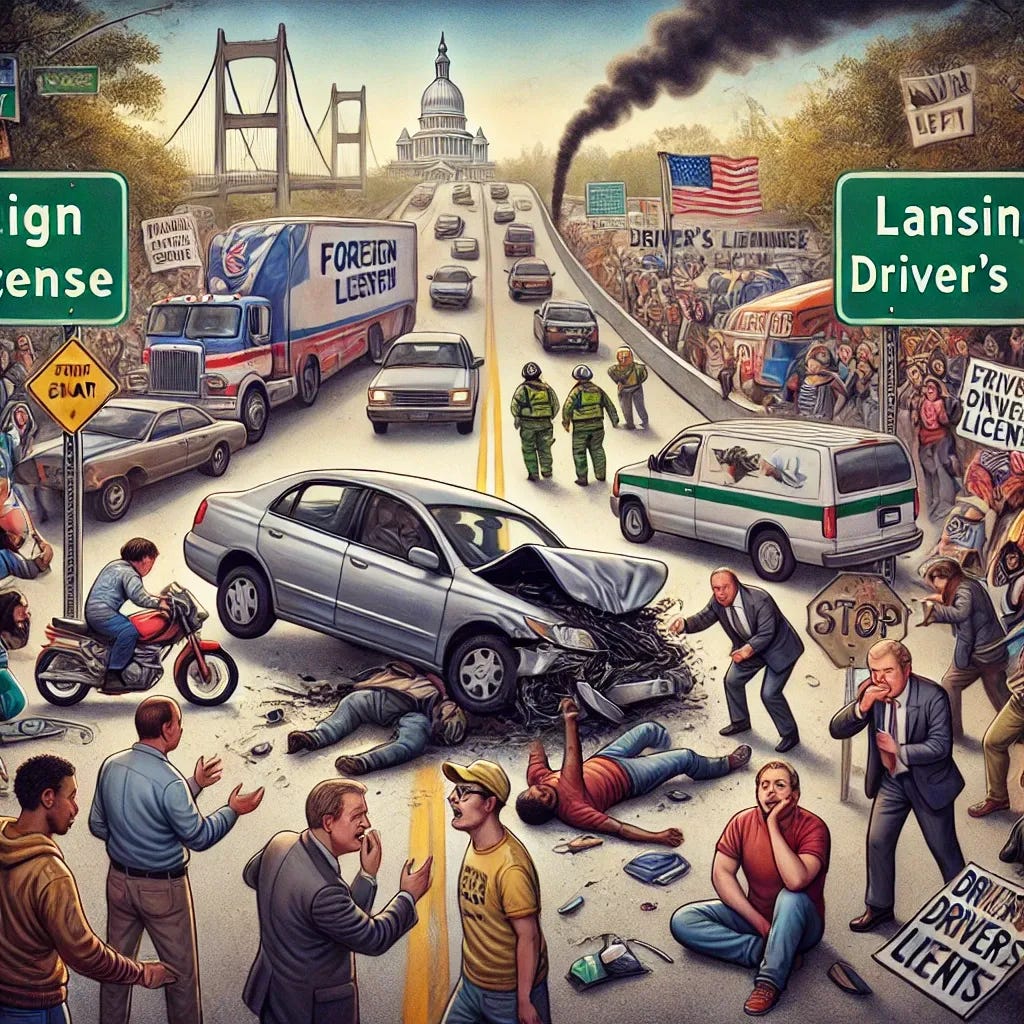The Government’s Handling of Undocumented Immigrants
Lessons from Post-9/11 America and a Message to MAGA Supporters
The way undocumented immigrants are being discussed today is heavily influenced by Trump’s rhetoric, which is fueled by widespread frustration across the country with Biden’s immigration policies. Trump, though not currently in office, has crafted a narrative in reaction to what his base perceives as failures in Biden’s approach to border security and immigration reform. This rhetoric mirrors post-9/11 tactics, where fear and division were weaponized to expand government power and target specific groups.
Fear as a Political Strategy
After 9/11, fear of terrorism became a tool for rallying public support for sweeping policies like the Patriot Act and increased surveillance. Similarly, Trump has seized on his supporters’ fears about immigration to galvanize his base.
Framing Immigration as a Crisis: Trump’s rhetoric focuses on portraying the southern border as a lawless, chaotic region under Biden’s leadership, emphasizing record-high crossings as evidence of failure.
Scapegoating Immigrants: Language like “invasion” and “criminals” is used to create a sense of urgency, painting immigrants as a direct threat to safety and economic stability.
Proposing Extreme Solutions: Trump promises a return to hardline measures, such as mass deportations and militarized enforcement, as a way to “restore order.”
This messaging resonates with his supporters, many of whom are correct in viewing Biden’s policies as too lenient, believing these policies contribute to issues like inflation and increased car insurance premiums.
Biden’s Policies and the Backlash
The Biden administration has taken steps that have exacerbated these concerns by seemingly ignoring the growing worries of voters across the political spectrum. Some have speculated that this strategy was intentionally designed to pave the way for Trump to return to office, allowing him to appear as the hero to a problem they created. However, this approach has sparked significant backlash, seemingly as intended:
Record Border Crossings: High numbers of migrants attempting to cross the border have fueled perceptions of chaos and lack of control.
Rollback of Trump-Era Policies: Efforts to undo controversial practices like family separation and the “Remain in Mexico” program have drawn criticism from those who see these measures as necessary deterrents.
Trump’s rhetoric capitalizes on this perceived lack of control, positioning himself as the solution to what he describes as Biden’s “open borders” policies.
Drawing Parallels: Post-9/11 and Today’s Immigration Rhetoric
Trump’s reaction to Biden’s policies bears striking similarities to the fear-driven governance of the post-9/11 era:
Targeting Vulnerable Groups: After 9/11, Muslims and Middle Eastern communities were disproportionately targeted. Today, undocumented immigrants—particularly those from Central and South America—are painted as threats.
Expanding Enforcement Power: Trump’s proposed measures include increased militarization, mass detentions, and aggressive deportations, echoing the expansive government authority seen after 9/11.
Distracting From Systemic Failures: Just as post-9/11 policies deflected attention from questions about U.S. foreign policy, Trump’s rhetoric diverts focus from systemic issues like wage stagnation, outsourcing, and economic inequality.
Why This Matters to Trump Supporters
The government’s handling of immigration, FEMA’s failures, and rhetoric-driven policies don’t just harm undocumented immigrants—they also hurt everyday Americans, including Trump supporters. While Trump’s rhetoric may resonate with his base, it’s important to recognize that the government’s broader failures impact all of us.
1. FEMA’s Failures and the Broader Implications
Take, for example, FEMA’s repeated failures during natural disasters, such as those in North Carolina. Many Trump supporters, along with other Americans, expected the government to provide the necessary relief to rebuild their homes and lives. Instead, FEMA delivered:
Delayed Responses: Aid took weeks or months to arrive, leaving families in desperate situations.
Minimal Assistance: Even when relief came, it barely covered the costs needed to rebuild homes or recover from the devastation.
Bureaucratic Inefficiencies: Endless paperwork, confusing processes, and denials of aid left many frustrated and stranded.
If FEMA couldn’t effectively support citizens during a crisis, why would the government prioritize anyone else? FEMA’s failures highlight a deeper issue: the system doesn’t work for the people it’s supposed to serve.
2. Martial Law Isn’t the Answer
Some may believe stricter government control, such as martial law, is a viable solution to immigration or other crises. However, history shows that martial law often exacerbates problems rather than solving them:
Erosion of Civil Liberties: Martial law suspends basic rights, replacing civilian processes with military rule.
Expanded Government Overreach: The power granted under martial law often extends beyond its initial purpose, affecting everyone—not just the targeted group.
Unintended Consequences: Measures meant to restore order can instead create more chaos and division.
Post-9/11 policies, such as mass surveillance and warrantless wiretaps, were initially justified as counter-terrorism measures but ended up affecting millions of ordinary Americans. Similarly, martial law in response to immigration would harm not only undocumented individuals but also citizens caught in the system’s overreach.
3. Divided We Fall
The fear-driven narratives surrounding immigration and disaster response are designed to divide us. By scapegoating immigrants or proposing extreme measures like martial law, the government distracts from systemic failures that impact everyone.
Economic Inequality: Blaming immigrants for job losses or rising costs ignores the real culprits, such as corporations outsourcing labor and wage suppression.
Infrastructure Failures: Resources spent on militarizing the border could be used to repair crumbling roads, improve schools, or strengthen disaster response systems.
Trump’s rhetoric may provide a sense of control or direction, but it doesn’t address the underlying issues that create instability for all Americans.
A Better Way Forward
Instead of falling for fear-based solutions or divisive rhetoric, we need to focus on real, actionable solutions that work for everyone:
Hold FEMA Accountable: Ensure disaster relief agencies are transparent, efficient, and responsive to the needs of all Americans.
Address Root Causes of Immigration: Invest in stabilizing economies abroad and reform foreign policies that contribute to migration.
Reject Martial Law and Overreach: Protect civil liberties and focus on policies that balance security with individual freedoms.
Rebuild Communities, Not Divisions: Focus on strengthening infrastructure, addressing economic inequality, and uniting Americans around shared goals.
Conclusion
The government’s mishandling of immigration and disaster relief shows a systemic failure to serve its people effectively. Trump’s rhetoric may resonate with frustrations, but fear-driven narratives and extreme measures aren’t the solution—they’re distractions.
Real solutions come from holding leaders accountable, addressing systemic issues, and rejecting policies that divide us. By focusing on fairness, equity, and shared progress, we can build a government that truly works for all Americans.
The Hidden Costs of Michigan's Broken Driving System
Michigan residents know all too well the daily struggles that come with living in a car-dependent state. Unlike cities like Chicago, where public transportation provides a viable alternative, Michiganders are forced to rely on their vehicles for everything—from work to grocery runs. This reliance comes with burdens that disproportionately affect lower-i…
How Opposition to the Antisemitism Bill Mirrors (and Amplifies) the Iraq War Protests
The controversy surrounding H.Res. 1449, which adopts the IHRA definition of antisemitism and potentially conflates criticism of Israel with antisemitism, bears striking similarities to the Iraq War protests of the early 2000s—only this time, the opposition has the potential to reach an even larger scale and broader coalition. The Iraq protests were a w…
Vote for Alyshia Dyer for Washtenaw Sheriff:
"Vote for Alyshia Dyer for Washtenaw Sheriff in Michigan, and I believe her position on traffic stops is the most Constitutional I’ve ever seen."
There's nothing wrong with keeping traditions and culture.
There's nothing wrong with keeping traditions and culture.






